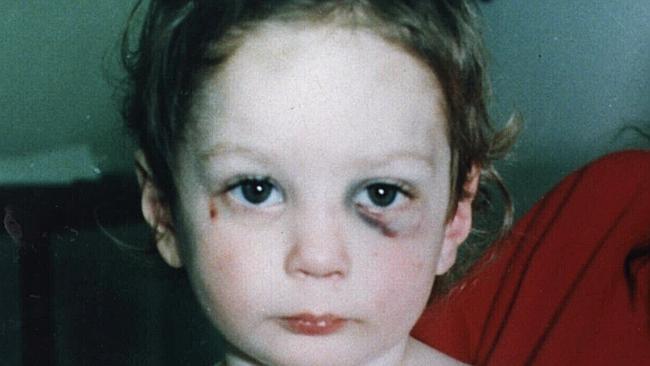We are still learning from Daniel’s death
When Daniel Valerio was killed, we grieved and laws were passed to protect kids. But the tragedies continue and we are denied the chance to grieve.

Opinion
Don't miss out on the headlines from Opinion. Followed categories will be added to My News.
IT’S been 24 years since little Daniel Valerio was killed. Yet the mere mention of his name immediately brings to mind the photograph that was distributed after he was beaten to death by Paul Leslie Aiton, his brute of a stepfather.
A vulnerable little boy, with pale skin and a mop of curls looking warily at the camera. Only two years old. And with a black eye and other marks on his body.
Nearly a quarter of a century on, the photograph can still bring you to tears. And it was the power of that photograph which brought about the laws which have saved other children from Daniel’s fate.
So moved was the community by his death in 1990, so outraged by the violence against him, that laws were introduced requiring authorities and health workers to report any suspicions they held that a child was being abused.
The mandatory reporting laws require health workers, doctors, maternal nurses, midwives, teachers, principals and police to make reports to child protective services if they form a reasonable belief that a child is being physically or sexually abused.
The new laws and community pressure followed revelations that Daniel’s injuries had been noted by many people, including police, in the weeks leading up to his death.
As the judge who sentenced Aiton to a 22-year term, Justice Philip Cummins, observed: “Daniel would be alive today if there had been mandatory reporting.’’
The community pressure leading to political action arose because the people connected with Daniel. How could they not, after seeing that heartbreaking picture?
That is why the decision by a court last week to suppress the identities of two babies attacked by their mother is so disappointing.
Ava and Alex were eight weeks old when assaults committed by their mother almost since their birth reached a crescendo. Ava died. Alex survived but will never walk, may never talk and looks likely to lose her sight in one eye.
Their mother was charged with murder and attempted murder but plea-bargained it to infanticide and recklessly causing serious injury. She received a one-year community corrections order. In a final insult, the court disregarded the wishes of the father suppressed identification of the girls or their mother. The judge said it was to protect the mother, Alex and her four-year-old brother. The father just wanted to mourn his daughter and acknowledge that she had lived and was loved.
Ava and Alex are not their real names. The public will never see their sweet faces unless a five-year suppression order is eventually overturned. Alex is now an active two-year-old. She can’t stand or talk, but she loves her swing on her grandmother’s porch and scribbling on paper.
This was the fifth infanticide case in Victoria. A diminished responsibility charge, it applies only to women who have given birth to the baby killed. The baby must be no older than two years and the woman must be deemed to be “of disturbed mind’’. None of the previous cases was suppressed.
This column neither supports nor condemns the decision to proceed with the charge. Instead, the condemnation must go to the decision to rob the babies of their identities and deny the public the opportunity to relate to a grieving family in an appropriate way.
The court heard two maternal health nurses employed by a local council saw the babies and noticed their bruises. They made notes, but didn’t report to child protection services, instead believing the mother’s explanations that the “little Houdinins’’ had escaped their swaddling and somehow bruised and marked each other.
Medical reports show the babies suffered multiple injuries, fractures, bruises, internal bleeding and brain injuries.
Nothing can bring back Ava or restore Alex’s health. But two things can go some way towards righting the injustice of their loss of identity.
Firstly, a coronial inquest must be held to determine if there were any systemic failings in the plight of the girls. The mother’s plea of guilty to the reduced charge robbed the parental family of the opportunity to have some of their questions answered.
A coroner’s inquiry — currently under consideration — would fix that.
Secondly, the loss of the baby’s identity has hampered fundraising efforts. Alex will need ongoing care for life. Her father, who once had two jobs, raises his children full-time on carer’s benefits.
Those who can donate can do so via electronic banking. The account is Baby Twins.
BSB: 083-166. Account: 84587 3727.
Twitter: @ellenwhinnett


